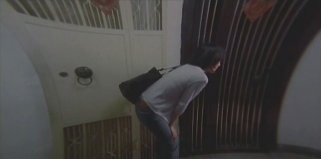
|
The EyeDecember 27, 2002
The Pang Brothers first came to international attention with the 1999 Thai gangster film, Bangkok Dangerous. Perhaps wearing its Woo and Wong Kar-Wai influences a bit too openly, the film showed real talent and its makers were marked as craftsmen to be watched in the future. Their new film, The Eye, fulfills the initial promise flashed in that earlier venture; it’s as creepy and unsettling a horror genre piece as you’re likely to find anywhere on the globe today. Inspired by a real story from the media, the plot revolves around a young blind woman named Mun (Angelica Lee) who receives cornea transplants so that she may regain the use of her eyes. After the operation she begins to experience strange visions, but as she has been without sight since childhood she is unsure at first exactly what it is that she’s seeing. Later, as she becomes more accustomed to her newfound visual acuity, the improving clarity of her sense does little to explain the odd occurrences that she continues to glimpse daily. Eventually enlisting the aid of her psychotherapist, Mun travels to Bangkok to seek out the family of the organ donor from whom she received her new eyes in the hopes of finding some explanation for what’s happening to her. The entire outing comes off in a smooth and stylish manner, paced evenly so that it maintains a quiet tension throughout. Angelica Lee’s performance as Mun isn’t spectacular but it’s a cut above what you often see in a genre work like this; she has a steady gravity that makes her performance seem completely natural. The scenes early on in the movie detailing her stay in the hospital as she gets her operation are especially effective in establishing the character and conveying the tentative nature of her return to the world of sight. The rest of the cast also contribute performances that aid in making this onscreen universe believable, with the therapist/boyfriend (Lawrence Chou) being particularly capable in a role that could easily have veered into maudlin sentimentality. The Pang Brothers show a real flair throughout The Eye for insidiously eerie moments that keep the movie taut as a garotte around your throat. The special effects are doled out judiciously for the most part, lending a vague sense of unease to the off balance universe that poor Mun finds herself in. The spirits are fleeting and blurry, their lack of focus reflecting both their own insubstantial fate and the lead character’s attempts to come to grips with a visual world. Jarring moments of filmmaking are interspersed with quieter, almost lilting moments throughout the film, with a well-timed sense that keeps the atmosphere unpredictable and edgy and the action moving at a comfortable clip. The film’s overall outstanding visual and aural landscape is worth singling out for praise here. Beautifully shot in a fairly limited palette of colors, the toned down chromatics of the photography outline the actions of the story perfectly, and the more expressive scenes burst with a frenetic, careening energy that makes them breathtaking to watch. The editing is also snappy when it needs to be but more restrained in the slower scenes; the directors understand inherently that even on a roller coaster you need to give the passengers a breather once in a while to keep things from being overwhelming. But perhaps most impressive is the filmmakers’ choice to use the soundtrack as a major device in developing their onscreen environment. Swirling, dissonant sounds are sometimes subtle yet other times menacingly loud, a simmering backdrop that enhances the tale as it unfolds. Choosing to make such import of what you hear during the movie is a deliberate choice by the directors to emphasize one of the senses that would be heightened in those lacking sight, and this insightful decision adds a sonic layer to The Eye’s rich texture. All the disparate parts assembled by the Pang Brothers here in creating The Eye add up to a strange, affecting genre film that revels in its offbeat nature and captivates with its arresting power. The able cast, solid story, well handled special effects and the tremendously capable hands of its directors combine to create a successful movie that again identifies these two as artists to continue to watch down the line. While it seems that their latest projects were done individually (Danny Pang’s Nothing To Lose and Oxide Pang’s One Take Only), one can only hope that these two work together again in the future. The creative excellence of the narrative of their current ghastly undertaking portends that even better should be in the offing.
|
Thursday, January 08, 2026
© 2006 Box Office Prophets, a division of One Of Us, Inc.